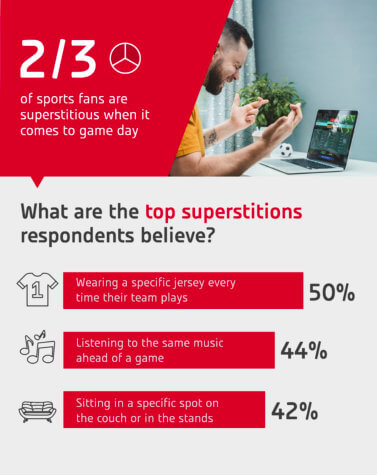New survey reveals that 3 in 5 sports fans have blamed themselves following a loss by their favorite sports team!
NEW YORK — A new study finds most American sports fans think they’re the biggest factor in whether their team wins or loses! Two-thirds of sports fans are superstitious when it comes to game day.
From wearing a specific jersey every time their team plays (50%) — with some not washing it until the end of the season (44%) — to sitting in a specific spot (42%), sports fans aren’t willing to take any chances.
‘I’m not superstitious, but I am a little stitious’
 The survey of 2,400 Americans who regularly watch or attend sporting events finds that 62 percent have blamed themselves for their team’s loss. A lot of that has to do with not wearing the right shirt or moving from their usual spot on the couch during the game. These superstitions go beyond respondents themselves: 38 percent feel someone in their family is “bad luck.” Of those fans, 84 percent have asked an unlucky individual to leave the room when the game is on.
The survey of 2,400 Americans who regularly watch or attend sporting events finds that 62 percent have blamed themselves for their team’s loss. A lot of that has to do with not wearing the right shirt or moving from their usual spot on the couch during the game. These superstitions go beyond respondents themselves: 38 percent feel someone in their family is “bad luck.” Of those fans, 84 percent have asked an unlucky individual to leave the room when the game is on.
Commissioned by Tipico Sportsbook and conducted by OnePoll, the survey found the stakes will be even higher as families gather for Thanksgiving.
Eight in 10 respondents (81%) say it’s “tradition” to watch or attend sporting events during Thanksgiving weekend. The same number believe sports are more exciting when they experience them with other people. Not only is it more exciting, but 71 percent also feel the “stakes” of the game are higher when they’re watching with friends and family members.
Part of that might be due to who they’re watching with, as 74 percent believe it’s more fun to watch and attend sporting events with rival fans. Another two in three people admit to purposely antagonizing their loved ones who support a rival team.
Care to make it interesting?
Results also show 59 percent have made friendly “bets” with loved ones while watching a game. This includes everything from making the loser of the bet pay the tab at a bar, to having them wear the other team’s jersey or colors or even getting a weird haircut or shaving their hair.
“Watching sports is an important part of American culture, especially as the holidays hit and we celebrate our favorite traditions with family and friends,” says Adrian Vella, CEO of Tipico Sportsbook, in a statement. “It’s natural that bettors feel there are higher stakes in the game when they’re watching with friends and family members and there’s an opportunity for friendly rivalries. With this in mind, they’re making bets while spending time with them during the holidays.”
“We know that fans and bettors take their sports seriously, so we are not surprised to hear that as part of their holiday sports tradition, they wager with or against family members to see who comes out on top.”
Don’t wish me luck!
Three in four Americans (74%) believe watching and attending sporting events is more exciting when they have “skin in the game.” Half of Americans (49%) have participated in sports betting and 90 percent of those respondents think sporting events are more fun when they have money riding on the outcome.
Of those who have participated in sports betting, 45 percent “always” do so when watching or attending a game. When it comes to their betting strategy, “trust my gut” is the most popular (41%), followed by having faith in the experts and betting on whoever is the favorite to win (36%).
However, people still worry about their sports superstitions while they’re betting. In fact, 55 percent of those who participate in sports betting think it’s bad luck if they hear “you can’t lose” or “it’s a lock.” Similarly, 54 percent of those respondents believe it’s actually bad luck if someone tells them “good luck.”
“Every sports bettor has a different strategy or technique they bring to the table in hopes of bringing them good luck,” adds Vella. “Whether it’s analyzing numbers, having a particular ritual, or abiding by a superstition, there are different practices for every bettor.”
